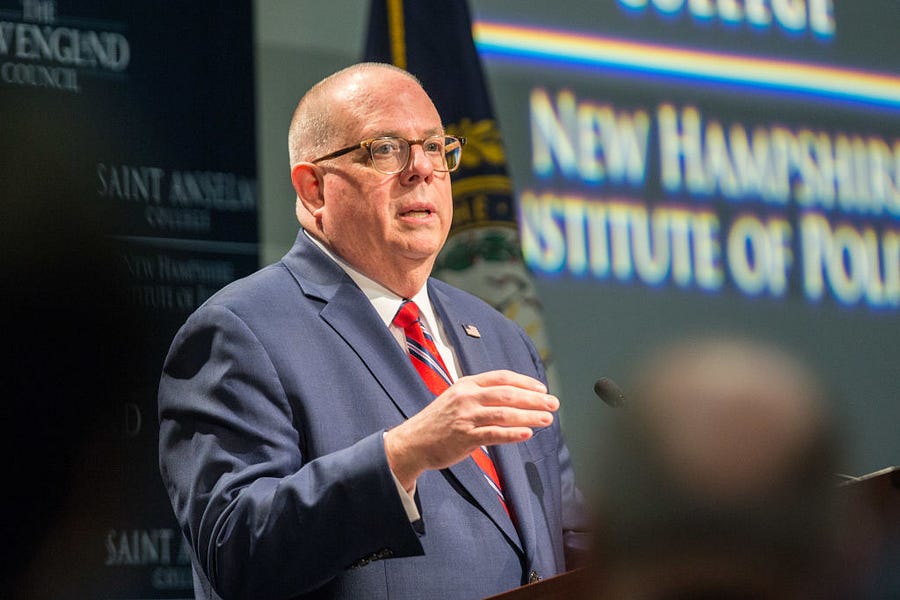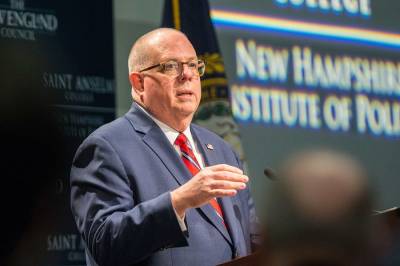Our summer odyssey continues as we visit some more potential contenders for the 2024 GOP presidential nomination. Anonymous sources continue to hint at a Trump run:
From Rolling Stone: Trump Is Telling His Dinner Pals He’s Planning to Run for President in 2024
From the New York Times: Why I’m Sure Trump Will Run for President in 2024
So this week, we are going to look at the people who will run even if (especially if?) Trump announces a Cleveland-esque third candidacy.
The Not-Again Trumpers
Larry Hogan: The Moderate’s Moderate
65 years old, governor of Maryland
If the centrist wing of the Republican Party were a teenage boy in the 1970s, Larry Hogan would be a poster of Lynda Carter. After winning his 2018 re-election bid by nearly 12 points in a state that has gone blue in the last eight presidential elections, he’s one of the most popular governors in the country—with an approval rating that reached 76 percent this year.
He’s now the co-chair of the bipartisan group No Labels, bringing together moderates from around the country and across the aisle, including Mitt Romney and Joe Manchin for a summit to talk about Biden’s infrastructure package. He’s governed by avoiding culture war fights, focusing instead on what he describes as “simple, common sense principles”—job creation, family assistance, and statewide economic recovery. What’s more surprising is that he’s maintained a fiscally conservative record—nixing billions in spending on light rail and education reform—while continuing to thrive in a blue state.
Hogan has also been more than willing to criticize the former president. In a 2020 op-ed, Hogan decried the Trump administration’s decision to force states to organize their own testing regimes, arguing that Trump “bungled the effort” to establish a nationwide COVID testing protocol. At the height of the pandemic, when the Trump administration was flailing, his South Korean-American wife helped him negotiate the purchase of half a million test kits for the state, and even though the tests turned out to be faulty, it somehow didn’t affect his reputation as a hero in the state.
Strengths: He may have the market cornered as the only anti-Trump moderate in the field, he’s got a compelling narrative both as governor and a cancer survivor, and he’s well liked by old guard Republicans and Acela-corridor donors with plenty of operatives lining up to work for him.
Weaknesses: He’s following a playbook John Kasich tried to run in 2016 with no success—and Kasich was from bigger, redder Ohio, he’ll have to bet it all on New Hampshire, which hasn’t worked for many (any?) GOP candidates in the last two decades, and he may not be alone in this lane if an Adam Kinzinger or Liz Cheney decides to jump in.
2024 Tea Leaves: He’s openly talked about it, saying, “I think it’s probably not likely that [Trump] will run, and you’ll have 10 or 15 or more people running to be the next Trump, and fighting for that 60 percent. And there’s possibly a wide-open lane with the other one-third of the people, who are the ones encouraging me.”
Chris Christie: The Trump Whisperer
58 years old, former governor of New Jersey
Christie, the tough-talking former governor of New Jersey, ran for president in 2016, and he’s already said he’s thinking about running again in 2024. Christie first burst onto the national scene in 2009 when he defeated New Jersey’s incumbent Democratic governor, becoming the first Republican in twelve years to win a gubernatorial contest in the reliably blue state. He quickly established a reputation for being a strong fiscal conservative, cancelling an $8.7 billion commuter rail tunnel between New York and New Jersey that would have been the largest public works project in the country.
Christie has been through his share of scandals, however. In 2012, he faced criticism from conservatives for his endorsement of President Obama’s disaster relief efforts, and in 2013, he was accused of shutting down highway lanes to retaliate against a Democratic mayor in what became known as “Bridgegate.” While the high point of Christie’s 2016 presidential run was his debate takedown of Marco Rubio, the candidacy itself was short lived—Christie dropped out after finishing sixth place in New Hampshire and endorsed Trump shortly after.
Now, Chris Christie says he won’t defer to Trump if the former president runs again in 2024, and he has recently taken shots at the Biden administration’s stances on infrastructure and voting rights. “What I want to do,” Christie said in May, “is to try to lead the party in a productive and smart way, for us to continue to argue for populist-type policies but not to be reckless.”
Strengths: Trump has never attacked Christie despite plenty of criticism the other way, Christie has stayed relevant with frequent TV appearances and has a book coming out in the fall, he’s a strong debater, and he has run a national race before.
Weaknesses: He doesn’t have much new to offer voters since his 2016 run, his support of Trump in the run up to 2020 coupled with his frequent criticisms of Trump since may leave him without a home base, and it will be hard to attract attention in Iowa and New Hampshire with so many new faces.
2024 Tea Leaves: He’s openly considering it.
Liz Cheney: The Lonely Stalwart
54 years old, congresswoman from Wyoming
Back in May, Cheney told Bret Baier she was not vying for the 2024 nomination. And even if she changed her mind, there is almost no chance the outspoken congresswoman would win the Republican nomination in 2024, despite her solid conservative credentials. The daughter of former Vice President Dick Cheney, Liz Cheney has served in Congress since 2017 as the representative at-large for the state of Wyoming. In 2019, she became the House GOP conference chair, the third ranking House Republican after minority leader Kevin McCarthy and Republican whip Steve Scalise.
After the 2020 election, however, Cheney ran afoul of Republican leadership over her forthright rebukes of Trump’s election lies. While House Republicans initially voted to keep Cheney in her leadership role after she backed the second impeachment effort in January, her continued criticism of the former president finally cost her that position. In May, the House Republican conference decisively voted to oust Cheney from her role as conference chair.
Since then, Cheney has come into increasing conflict with McCarthy and other congressional Republicans, most recently over her decision to accept a spot from Speaker Nancy Pelosi on the House January 6 select panel. At the same time, Trump’s top political advisors have been working to unseat Cheney in her Wyoming district, where they believe she is politically vulnerable.
For now, Cheney’s top goal is simply to prevent Trump from winning the presidency again in 2024. “He must not ever again be anywhere close to the Oval Office,” she said in a recent interview. “I'm going to do everything that I can, both to make sure that that never happens, but also to make sure that the Republican Party gets back to substance and policy.”
Strengths: She has an unimpeachable conservative voting record, high (last) name ID, access to national donors, experience—albeit as a daughter—with presidential campaigns, and a proven ability to get under Trump’s skin and not back down.
Weaknesses: Even folks who want to move on from Trump may not get behind someone who voted to impeach him, her foreign policy stances are now out of step with the majority of the party, and she doesn’t have the big personality that a David often needs to take on Goliath.
2024 Tea Leaves: She faces serious primary headwinds in 2022 as challengers have been coming out of the woodwork—in a primary without a runoff, more opponents are a good thing, but Trump seems to understand the urgency of uniting the Cheney-haters behind a single challenger. She told Baier she wasn’t running, but she also has said she isn’t “ruling anything in or out.”
What is foaming Stirewalt’s latte these days? The politics of spending … and I’m very here for it.
Obama Pollster’s Timely Warning on Spending
Former Obama pollster Joel Benenson has some advice for congressional Democrats as it relates to going big on domestic spending proposals and the midterm elections: Watch out.
Sharing his data with Axios on how persuadable voters are likely to receive additional spending crammed into the multi-trillion-dollar packages bouncing around Congress, Benenson urged caution. “You gotta win the middle to win,” he said. It’s a warning that will likely have few admirers on the left wing of the Democratic conferences in both chambers.
In those quarters, the potential failure of the bipartisan infrastructure bill President Biden is trying to shepherd through is likely to be received as good news. If the compromise plan sinks, it would probably increase the ceiling on the companion party-line legislation the Blue Team aims to pass using the procedural maneuver called budget reconciliation. If progressives and Senate Majority Leader Chuck Schumer succeed in what looks like an effort to stampede the gangsters off of their $1.2-trillion bipartisan bill, that money could also go into the pot for the party-line vote. Even better, it would go in without having to make any concessions on how the money would be spent.
Now, that relies on all 50 Democrats staying on board. West Virginia Sen. Joe Manchin’s goldilocks sensibilities will no doubt be even sharper in light of his reversal on a possible re-election run in 2024. The same goes for Arizona Sen. Kyrsten Sinema. But if Republicans bolt from the compromise plan, as former President Trump is urging them to do, moderate Democrats might be open to some upward revisions on the party-line package. As they consider how much, they ought to heed Benenson’s advice.
While voters sometimes punish politicians for flip-flopping or inconsistency, the reverse is never true. Voters are allowed to hold contradictory views, and they usually do. Voters love free money, stimulus checks, and massive domestic spending packages. But they also hate deficit spending and inflation. Politicians in both parties have very much enjoyed the vacation from the politics of fiscal restraint, but the end will invariably come. Nothing like higher consumer prices to put a damper on the festivities.
Biden sure knows it, which helps explain why he is so eager to have Republicans sign off on at least some of the spending. This is also why Trump wants the compromise to go down. In Trump’s best-case scenario, “infrastructure week” would be as much of a punchline for Biden as it was for him. If Trump is playing Grover Cleveland to Biden’s Benjamin Harrison, the best-case scenario would be for the bipartisan bill to fail, and then for the left wing to overreach on the companion bill causing it to fail. No infrastructure gets built while still delivering fresh talking points about radical Democratic policies.
Schumer could be acting out of his own primary considerations for 2022, or maybe this is just gamesmanship. But whatever it is, he should be listening to Benenson. The party is almost over on spending, and Democrats would be wise to not be the last ones standing on this game of fiscal musical chairs.









Please note that we at The Dispatch hold ourselves, our work, and our commenters to a higher standard than other places on the internet. We welcome comments that foster genuine debate or discussion—including comments critical of us or our work—but responses that include ad hominem attacks on fellow Dispatch members or are intended to stoke fear and anger may be moderated.
With your membership, you only have the ability to comment on The Morning Dispatch articles. Consider upgrading to join the conversation everywhere.